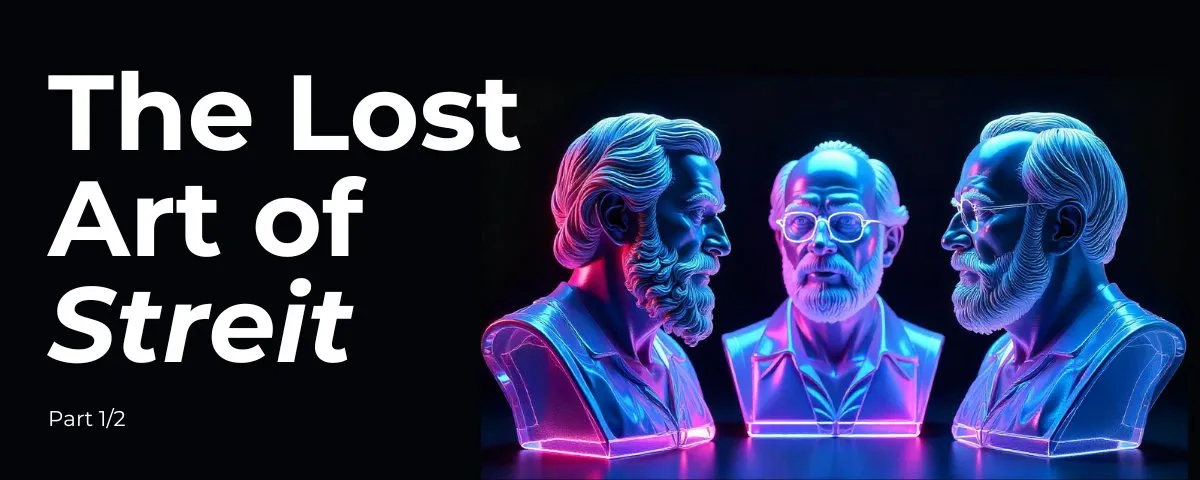
“I won’t be talking politics with the family this Thanksgiving,” announced 71% of Americans in a recent survey. Not because they lack opinions—they have plenty—but because they’ve concluded meaningful conversation across political divides is impossible.
In the same week, over 170 million comments were posted across social platforms. We’re drowning in words while starving for understanding.
This paradox would have bewildered the philosophers and thinkers who built our intellectual traditions. From the Athenian agora to Renaissance salons, meaningful disagreement was purposefully cultivated. Today, we’re more connected than ever, yet we’ve forgotten how to argue effectively.
There’s a German term that, in its original essence, captures what we’ve lost: Streit.
Unlike the English “argument” with its connotation of dysfunction or “debate” with its intellectual and ordered format, Streit used to describe purposeful, passionate disagreement - a collaborative clash that produces clarity. In German intellectual tradition, engaging someone in Streit shows respect: their ideas matter enough to be challenged.
This practice had been driving human progress for centuries, from Socrates’ dialogues to scientific discourse. When we lose it, we lose more than civility: we lose our collective ability to advance.
Technology didn’t invent tribal thinking, but it supercharged it. Scroll for five minutes on any social media app and you’ll notice how technology has transformed our discourse. Content algorithms feed us information that confirms our biases or triggers our outrage. We are not rewarded for reconsidering our foundational assumptions, but for consumption of content and ads.
When people disagree online, two patterns can be observed:
Neither pattern produces wisdom. The result? A society that talks constantly but converses rarely.
The solution isn’t less disagreement, it’s better disagreement. We need to reclaim Streit as essential intellectual practice: genuine, respectful conflict that tests ideas and generates insight.
When Galileo muttered “Eppur si muove” (“And yet it moves”) after being forced to deny that Earth revolves around the sun, he embodied a profound truth: the clash between established dogma and new understanding is what drives human progress.
Throughout history, the greatest thinkers have recognized that meaningful disagreement is essential for growth. Their collective wisdom forms the backbone of what Germans call Streitkultur - a tradition that treats conflict not as a failure of civility, but as a necessary condition for clarity, progress, and truth.
Picture Socrates wandering the streets of ancient Athens, seeking challengers rather than admirers. He probed contradictions and invited others to test his ideas as rigorously as he tested theirs. “If you can convince me that I am wrong, I will change,” he maintained - recognizing that truth emerges through dialogue rather than proclamation.
Fast forward two millennia to Hegel who observed that human understanding doesn’t advance in a straight line, it evolves through the collision of opposites. From thesis and antithesis comes synthesis: a higher truth that carries forward the best of both sides. “Contradiction,” he wrote, “is the root of all movement and vitality.” Without conflict, thought becomes stagnant.
Mill stood guard against intellectual complacency, warning that unchallenged ideas inevitably degrade into “dead dogma”, beliefs we parrot without truly understanding. “He who knows only his own side of the case knows little of that,” he insisted, showing that even the truth becomes fragile if we forget how to defend it.
In our own era, Habermas reminds us that productive conflict requires mutual effort. His concept of “communicative action” envisions disagreement as a collaborative process where participants recognize each other as equals, provide reasoned arguments, and genuinely seek understanding rather than merely strategic advantage.
Good arguments sharpen our thinking. Strong objections expose blind spots in our reasoning. Genuine challenges force us to articulate what we truly believe and why. A culture that forgets how to argue well grows vulnerable and becomes unable to adapt.
We need the kind of Streitkultur that makes room for passionate conviction alongside generous engagement, rooted in the understanding that through spirited disagreement, we all move forward together.
In our next article, we’ll explore the hidden societal costs of our filtered world and how we can rebuild spaces that foster meaningful disagreement in the digital age.